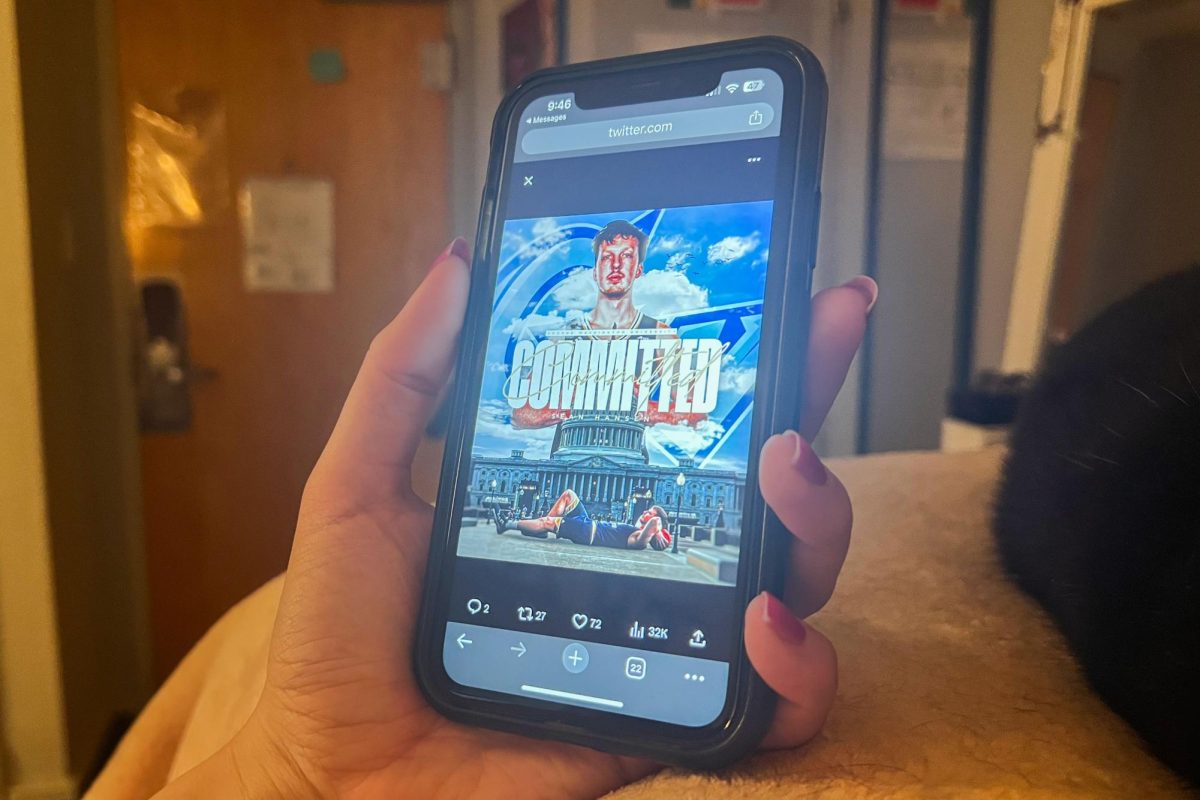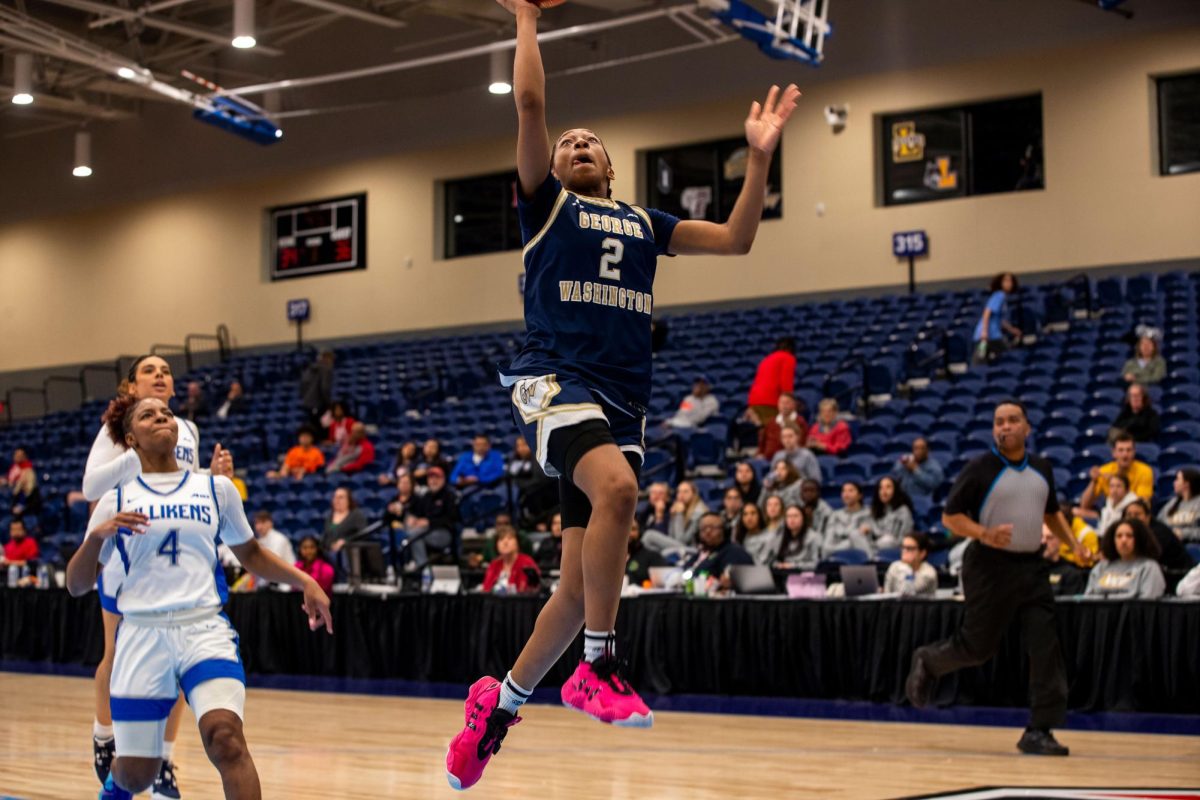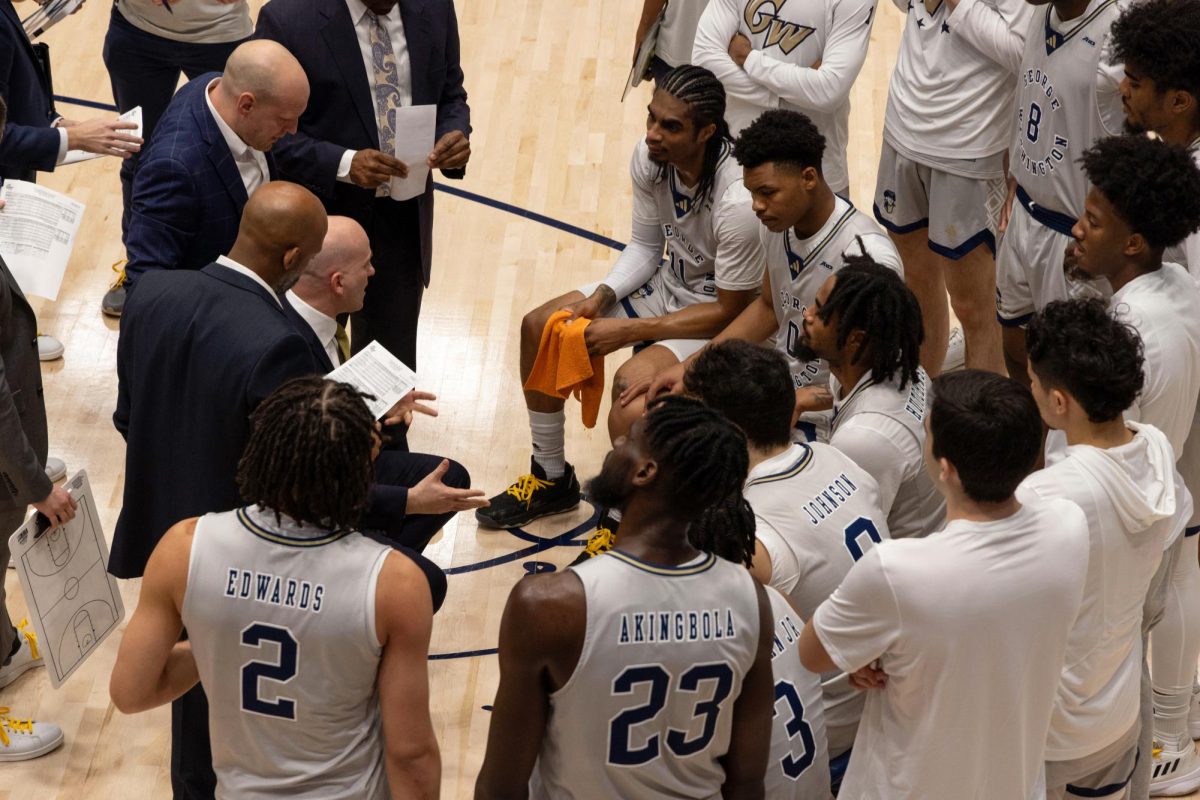When senior Dokun Akingbade’s name was announced during the starting lineups Tuesday night at the Smith Center, the injured Cheyenne Moore stood waiting to greet the center at the end of a makeshift catwalk lined with GW men’s basketball players.
Akingbade stepped up to Moore and raised his hands, awaiting a pat down from his teammate. Akingbade, who was red-shirted last season, hid a smile as Moore playfully inspected the 6-foot-9 player before he stepped onto the court for the Colonials’ game against Dartmouth College. There was nothing tangible, no contraband that Moore could feel, but Akingbade had something up his sleeve – a little late game aggression for the lowly Big Green.
With four minutes and nine seconds remaining in the game, GW held a strangling 85-46 lead. Senior Regis Koundjia, GW’s starting forward, stole the ball and reverse-dunked it with two hands. A few seconds later, Akingbade knocked another ball away from Big Green and brandished his hidden weapon: a dunk to give GW a 43-point lead.
The two consecutive plays, executed crisply and with the style of a physically superior Karl Hobbs-led team, were a microcosm of the ease with which GW beat Big Green, a team that hasn’t won its league or qualified for the post season since 1959.
What turned out to be a glorified exhibition gave the 3,261 fans at the Smith Center a chance to see GW tangle with an opponent in a game that counts in the teams’ records but does not accurately depict nearly any team the Colonials will face all season. Playing extremely inferior opponents early in the season is commonplace in college basketball. Teams are paid around $70,000 to visit a team at home and provide what often turns out to be a warm up for the better squad.
After a 45-point victory two things are left over: a two-hour highlight reel and the question whether the victory was productive or a false confidence builder.
Hobbs said he thought the bludgeoning illustrated fundamental issues his team will have to overcome in the coming weeks.
“I thought we got a little lazy at times fighting over screens,” Hobbs said. “I thought our communication broke down on a few switches. I believe in our secondary break, we kept the ball to one side of the floor.”
Hobbs will continue to correct these perceived flaws in practice and against opponents of much less skill. GW’s stroll over Dartmouth and upcoming game against Longwood Friday night represent two of the five teams the Colonials face in a seemingly easy November. GW travels to Georgia Nov. 21 to face Kennesaw State. On Nov. 26, the Colonials will face Providence College, a Big East squad, in Rhode Island. GW’s first game of December is against Virginia Tech in the BB&T Classic, followed only six days later by a trip to Anaheim, Calif., where Hobbs’ team will tangle with the University of Southern California.
The four teams GW plays leading up to Providence won a combined 29 games last year and failed to qualify for either postseason tournament.
When a reporter asked Carl Elliott, GW’s senior guard and leading scorer against Dartmouth with a career-high 29 points, if the games would help them prepare for Providence, the Colonials’ first test, Hobbs quickly interjected.
“I think we play Longwood,” Hobbs said before Elliott could speak. “I think we play Longwood. When we play Longwood, we’ll focus and try to beat them and we won’t think about anybody beyond that because that’s not how we do at GW.”
For GW’s November opponents, the situation is slightly different. Four days before GW plays Providence, the Friars play Boston College at home. Virginia Tech will have already seen an NCAA tournament team in Iowa.
Jack Kvancz, GW’s director of athletics, said the disparity represents two schools of thought when scheduling early-season games. A team can go out and play tough teams on the road and struggle for wins or, his preferred method, play easier teams where wins are all but guaranteed.
“If I’m 5-0 and you’re 8-8, I’ll walk around with some swagger,” Kvancz said. “I just happen to think being 6-0 is better than being 3-3.”
Kvancz maintained that going on the road and getting “drubbed” may help strengthen a team’s psyche but he never bought into the idea. But going back, the theory has not always been the same. Most notably, following GW’s 1993 Sweet 16 appearance, Mike Jarvis’ team played North Carolina and South Carolina. In 1994, GW played at Syracuse and Duke and in 1997 the Colonials played Kentucky, all early in the season. Half of Jarvis’ teams made the NCAA tournament and only one failed to qualify for any postseason event.
This season, GW is effectively playing with an entirely new squad. Elliott, Rice and Koundjia are the only players who averaged double-digit minutes last year, so the theory of drubbing worse teams at home could prove beneficial. Hobbs is able to see players execute against opponents, but will they be ready for Providence a week from Sunday?
Hobbs just wants to beat Longwood.







